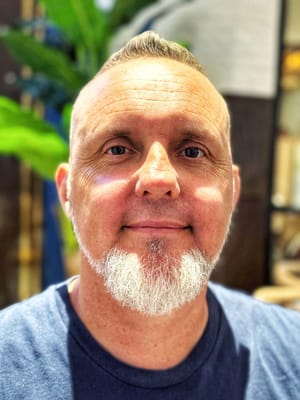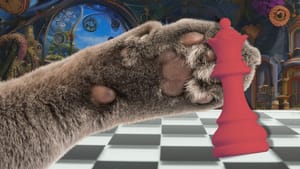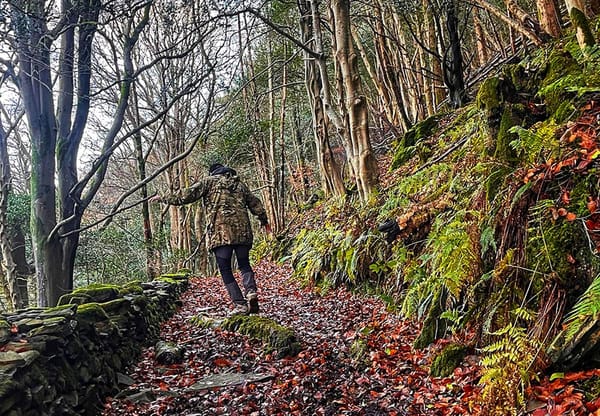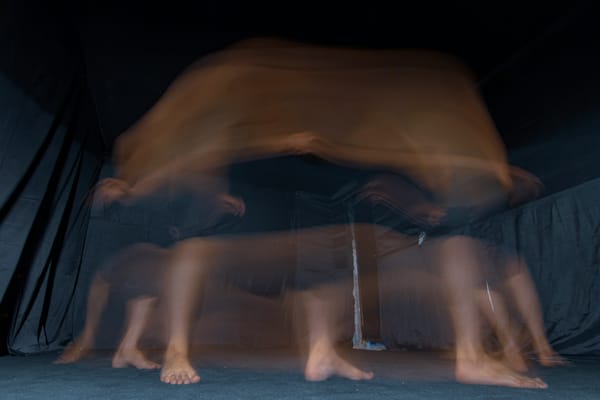The other day, while walking on a dirt path in Hucín, a small village in Slovakia, I caught myself doing what philosophically inclined people often do—getting lost in thought about getting lost in thought. The irony wasn't lost on me. As a philosophical coach, I frequently see how this same pattern plays out with clients: the tension between deep reflection and practical living.
Philosophy can be a beacon of hope, a roadmap to greater self-awareness, and even a lifeline in difficult times. But as many thinkers, from ancient sages to modern scholars, have discovered, it can also become a labyrinth of endless introspection—what could be called 'the hamster wheel of rumination'.
Thanks for reading Coaching Philosophia! Subscribe for free to receive new posts and support my work.
This raises an essential question: How do we ensure that philosophical reflection brings clarity and growth instead of trapping us in perpetual analysis?
The Allure—and Risk—of Deep Reflection
Throughout history, some of our greatest minds have wrestled with existential questions to the point of despair, alienation, and even madness. The drive to explore life's deepest questions has pushed some to psychological extremes, yet it has also yielded profound insights that continue to shape our understanding of the world.
Philosophy's promise lies in its ability to articulate inner struggles, bring order to chaotic thoughts, and frame existential dilemmas in ways that promote meaning. However, too much introspection without application can isolate us, leading to theories that remain self-referential rather than useful.
That said, it is also important to acknowledge that philosophy does not always require immediate practical application to be valuable. Some lines of thought, while seemingly abstract, have later shaped science, ethics, and governance. The challenge is knowing when to let philosophy guide us and when to step beyond contemplation into lived experience.
The Reality Check of Practical Life
No matter how profound our ideas, certain aspects of life remain unmoved by our philosophical interpretations. Everyday practicalities—meeting financial obligations or mastering a skilled trade—have rules and boundaries that exist independently of our philosophical musings. A carpenter's joint either holds or it doesn't, regardless of our theoretical understanding of woodworking. A bank account either balances or it doesn't, no matter our philosophical position on the nature of money.
These grounding forces serve as vital anchors, reminding us that we cannot simply live in our heads. Much like a scientist's hypotheses must ultimately face experimental validation, our philosophical insights must withstand the test of practical application. Consider how differently we understand patience after actually practising it during a challenging interaction, or how our theories about resilience transform when faced with real setbacks.
Moreover, practical tasks provide an invaluable feedback loop that philosophical contemplation alone cannot offer. If we wire a lamp incorrectly, reality provides immediate, unambiguous feedback. If we misread someone's emotional state, their response quickly corrects our assumption. This concrete feedback serves as a natural check against excessive speculation, pushing us to refine our understanding through direct experience rather than pure theory.
This is precisely why many ancient philosophical traditions emphasised practical wisdom (phronesis) alongside theoretical knowledge (theoria). They recognised that true understanding emerges from the dialogue between thought and action, theory and practice. The Stoics, for instance, didn't just theorise about virtue—they developed specific exercises to practise it in daily life.
Why We May Need to Return to Natural Wisdom
Our hunter-gatherer ancestors navigated life's complexities not through endless philosophical treatises but through direct engagement with their environment. What we might call 'natural wisdom' emerged from this interplay between experience and reflection—not as mere instinct, but as a deep understanding born from lived experience.
Living on the Isle of Man, I witness daily how the interplay of elements shapes everything around us. The wind doesn't theorise about its direction, yet it shapes our landscape. The tides move with a rhythm that demonstrates timing without conscious calculation.
Yet human existence presents a unique challenge. Unlike natural forces, we possess the ability to step back from experience and examine it. This capacity for reflection is both our strength and our potential stumbling block. When we overthink, we can lose touch with the very wisdom we're trying to understand. The key is integration—finding ways to let our reflective nature enhance rather than inhibit our engagement with life.
Consider how a skilled sailor reads the weather not simply through meteorological charts alone but through years of observing cloud patterns, wind shifts, and water behaviour. Or how a master chef develops an intuitive understanding of flavours that transcends any cookbook's instructions. This is natural wisdom in practice—where knowledge transforms into something more profound through deep engagement with reality.
The etymology of 'philosophia', the love of wisdom, reminds us that true wisdom emerges not from the mere accumulation of knowledge, but from the delicate dance between understanding and experience, between knowing and being. It's in this space—where knowledge meets lived experience, where reflection meets action—that we find the kind of wisdom our ancestors knew: not just information held in the mind, but truth embodied in living.
The Power of Embodied Philosophy
As such, embodied practices offer unique insights into philosophical truths that pure intellectual understanding cannot access. As a martial artist and teacher, I often see this played out in practice. For example, consider how martial arts illuminate core philosophical concepts: the nature of power and vulnerability, the relationship between self and other, the dynamic between control and adaptation. When executing a technique, philosophical musings like 'yielding strength' or 'mindful action' metamorphose from intellectual propositions into embodied wisdom.
This embodied understanding reveals philosophical truths in ways that transcend mental conceptualisation alone. Through embodied practice, we discover how intention shapes action, how presence affects perception, and how wisdom manifests in the space between thought and response. A martial artist learning to respond without tension, for instance, isn't just performing a physical act—they're embodying the philosophical principle of effortless action (wu-wei) that centuries of thinkers have explored.
The body serves as a laboratory where philosophical principles become tangible reality. When we experience how tension restricts movement or how forced effort diminishes power, we're not just learning physical lessons—we're encountering fundamental truths about the nature of effort, intention, and effectiveness. These insights extend far beyond physical practice, offering wisdom about how we approach challenges, relationships, and life itself.
The body often knows what the mind overcomplicates. In moments of integrated action—where thought and movement unite—we experience a form of understanding that pure intellectual reflection cannot achieve. This is why many Eastern philosophical traditions emphasise embodied practice as a path to wisdom (or what John Vervaeke would term an 'ecology of practices'), recognising that some truths must be embodied to be truly understood.
The Role of Community in Grounding Thought
While philosophy has a reputation for solitary contemplation, it has historically thrived in dialogue and community. The ancient Greeks philosophised while walking together. Eastern wisdom traditions emphasise sangha—a community of practice. Sharing insights and testing them against others' experiences keeps reflection from spiralling into isolation.
This is why philosophical coaching, discussion groups, and structured mentorship can be powerful—they provide frameworks that help keep introspection connected to practical reality. Ideas that might otherwise cycle endlessly in solitary thought often find natural resolution when explored in conversation.
Escaping the Hamster Wheel: A Path to Praxis
Praxis is the synthesis of knowledge and action, reflection and application. But meaningful integration requires more than simply alternating between thinking and doing. It demands a fundamental shift in how we approach both our philosophical inquiry and our everyday experiences.
The key lies in developing what the ancient Greeks called phronesis—practical wisdom that emerges when reflection and action inform each other. This begins with recognition that philosophical insights gain their true value not in the moment of understanding, but in the process of living them.
Consider approaching your daily experiences as opportunities for philosophical exploration. When facing a difficult decision at work, rather than retreating into abstract analysis, engage with the situation as a living philosophical question. Let your theoretical understanding of ethics or decision-making inform your choices, but also allow the experience itself to deepen and challenge your understanding.
Similarly, when engaging in philosophical reflection, anchor your thinking in concrete experience rather than abstract speculation. Instead of contemplating the nature of friendship in general, examine how your understanding of friendship manifests in your actual relationships. Let real experiences guide your inquiry, and let your insights shape future actions.
This recursive loop between thought and action creates a dynamic where each enriches the other. Your philosophical understanding becomes more nuanced through practical application, while your actions become more purposeful through philosophical reflection. The goal isn't to find perfect answers, but to develop a more integrated way of being where wisdom emerges through the very process of engaged living.
Try this exercise today: Choose one philosophical insight that resonates with you. Instead of analysing it further, identify one small action that expresses this insight. Perhaps it's showing patience in a typically frustrating situation or practising presence during your morning routine. Notice how the action enriches your understanding in ways that thought alone cannot.
The Dance of Thought and Action
Philosophy finds its truest expression not in endless contemplation but in the dynamic interplay between reflection and action. Like a skilled dancer who seamlessly blends technique with artistry, we must learn to move fluidly between deep thought and engaged living. This dance isn't about finding perfect balance—it's about developing the wisdom to know when to reflect and when to act.
Today, walking that same dirt path in Hucín where this reflection began, I notice something different. The crunch of gravel under my feet, the whisper of wind through the trees, the distant call of birds—these aren't just background to my thoughts anymore. They're part of the philosophical experience itself. Each step is both a embodied act and a moment of understanding, a living reminder that wisdom emerges not from thinking about life, but from thinking with it.
The path, both literal and metaphorical, continues ahead. But now, rather than getting lost in thoughts about getting lost in thoughts, I simply walk—present to both the profound questions and the simple act of putting one foot in front of the other. Perhaps this is what practical philosophy truly means: not the perfect resolution of life's mysteries, but the ability to walk with them, one step at a time.










Member discussion